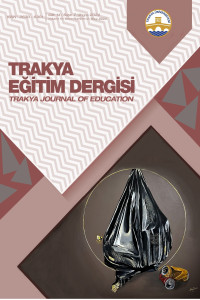Öz
Bu çalışmanın amacı, küreselleşmenin eğitim üzerindeki sonuçlarını incelerken, Türkiye’deki uluslararası öğrenciler üzerine bir araştırma yapmaktır. Bu öğrencilerin sayıları, eğitim düzeyleri, bölümleri ve uyruklarına göre dağılımları Yükseköğretim Kurulu (YÖK) tarafından yayımlanan istatistiksel veriler kullanılarak ele alınmaktadır. Bu verilerin analizinde nitel araştırma yöntemlerinden biri olan genel tarama yaklaşımı kullanılmaktadır. Tarama yöntemleri, örneklem boyutunun büyük olduğu araştırmalarda sıklıkla kullanılan bir analiz yöntemi olmaktadır. Daha rasyonel sonuçlara ulaşabilmek için araştırmanın kapsamı son beş yılla sınırlandırılmıştır. Elde edilen bulgulara göre, Türkiye'deki uluslararası öğrenci sayısının her geçen yıl arttığı gözlemlenmektedir. En fazla tercih edilen öğrenim düzeyi lisans olurken, en fazla tercih edilen bölümün ise işletme bölümü olduğu görülmektedir. Bu öğrencilerin genellikle Türkiye’nin komşu ülkelerinden, Orta Doğu ve Afrika ülkelerinden geldiği, ancak öğrencilerin mezuniyet oranlarına baktığımızda ise, Avrupa’dan gelen öğrencilerin daha başarılı olduğu gözlemlenmektedir.
Anahtar Kelimeler
Kaynakça
- Agarwal, V. B., & Winkler, D. R. (1985). Migration of foreign students to the United States. The Journal of Higher Education, 56(5), 509-522.
- Alagöz, S. B., & Geçkil, T. (2017). Yabancı uyruklu üniversite öğrencilerinin sorunlarının incelenmesi: Konya ili örneği. Anadolu Hemşirelik ve Sağlık Bilimleri Dergisi, 20(4), 279-285.
- Altbach, P. G. (1986). The foreign student dilemma. Teachers College Record, 87(4), 589-610. Altbach, P. G. (1989). The new internationalism: Foreign students and scholars. Studies in Higher Education, 14(2), 125-136.
- Altbach, P. G. (1991). Impact and adjustment: Foreign students in comparative perspective. Higher Education, 21(3), 305-323.
- Altbach, P. G. (2004). Higher education crosses borders: Can the United States remain the top destination for foreign students?. Change: The Magazine of Higher Learning, 36(2), 18-25.
- Bailey, K. D. (1994). Methods of social research. Simon and Schuster.
- Bakhtiari, S., & Shajar, H. (2006). Globalization and education: Challenges and opportunities. International Business & Economics Research Journal (IBER), 5(2), 95-101.
- Baltacı, A. (2019). Nitel araştırma süreci: Nitel bir araştırma nasıl yapılır? Ahi Evran Üniversitesi Sosyal Bilimler Enstitüsü Dergisi, 5(2), 368-388.
- Banks, J. A. (1993). Multicultural education: Development, dimensions, and challenges. The Phi Delta Kappan, 75(1), 22-28.
Öz
The goal of this study is to conduct research on international students in Türkiye while examining the consequences of globalization on education. The distribution of numbers, education levels, departments and nationalities of these students is discussed using statistical data published by the Council of Higher Education (CHE). The general screening approach, one of the qualitative research methodologies, is used to analyse this data. Survey methods are a common analysis tool in big sample size investigations. To achieve more rational results, the scope of the investigation was limited to the last five years. According to the findings, it is observed that the number of international students in Türkiye is increasing year after year. While bachelor education is the most preferred level, the most preferred department is business administration. These students are mostly from Türkiye's neighbouring nations, the Middle East, and Africa, yet when we look at graduation rates, we see that students from Europe are more successful.
Anahtar Kelimeler
Education Globalization International students Multiculturalism
Kaynakça
- Agarwal, V. B., & Winkler, D. R. (1985). Migration of foreign students to the United States. The Journal of Higher Education, 56(5), 509-522.
- Alagöz, S. B., & Geçkil, T. (2017). Yabancı uyruklu üniversite öğrencilerinin sorunlarının incelenmesi: Konya ili örneği. Anadolu Hemşirelik ve Sağlık Bilimleri Dergisi, 20(4), 279-285.
- Altbach, P. G. (1986). The foreign student dilemma. Teachers College Record, 87(4), 589-610. Altbach, P. G. (1989). The new internationalism: Foreign students and scholars. Studies in Higher Education, 14(2), 125-136.
- Altbach, P. G. (1991). Impact and adjustment: Foreign students in comparative perspective. Higher Education, 21(3), 305-323.
- Altbach, P. G. (2004). Higher education crosses borders: Can the United States remain the top destination for foreign students?. Change: The Magazine of Higher Learning, 36(2), 18-25.
- Bailey, K. D. (1994). Methods of social research. Simon and Schuster.
- Bakhtiari, S., & Shajar, H. (2006). Globalization and education: Challenges and opportunities. International Business & Economics Research Journal (IBER), 5(2), 95-101.
- Baltacı, A. (2019). Nitel araştırma süreci: Nitel bir araştırma nasıl yapılır? Ahi Evran Üniversitesi Sosyal Bilimler Enstitüsü Dergisi, 5(2), 368-388.
- Banks, J. A. (1993). Multicultural education: Development, dimensions, and challenges. The Phi Delta Kappan, 75(1), 22-28.
Ayrıntılar
| Birincil Dil | İngilizce |
|---|---|
| Konular | Çok Kültürlü Eğitim, Yükseköğretim Politikaları, Yükseköğretimde Uluslararasılaşma |
| Bölüm | Makaleler |
| Yazarlar | |
| Erken Görünüm Tarihi | 25 Mayıs 2024 |
| Yayımlanma Tarihi | 30 Mayıs 2024 |
| Gönderilme Tarihi | 28 Ekim 2023 |
| Kabul Tarihi | 1 Nisan 2024 |
| Yayımlandığı Sayı | Yıl 2024 Cilt: 14 Sayı: 2 |

